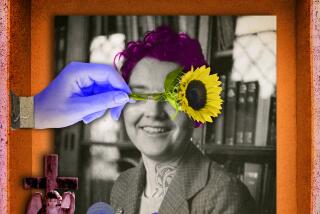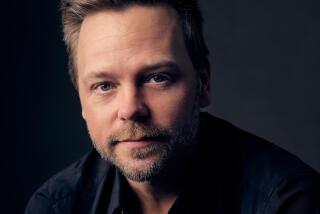Review: Nell Zink’s comic ‘Mislaid’ is quick-paced, problematic
- Share via
Mislaid, misnamed, misconstrued — all of these terms could describe Nell Zink’s exuberant but problematic second novel, a comedy of manners and errors about sexuality, race and class in the American South.
The time is 1960s post-segregation Virginia, and Peggy, a freshman and aspiring playwright with a “pent-up” sex drive and frustrated lesbian desires, is studying literature at Stillwater College when she falls under the spell of Lee, a famous and wealthy poetry professor. Although Lee not so secretly enjoys his own adventures with members of his own sex, the two embark on an affair and, after a surprise pregnancy, get married.
Ten predictably frustrated years later, Peggy leaves Lee and their 9-year-old son, Byrdie. Rather than escaping to New York, as Lee expected, she instead changes her name and moves with her daughter Mireille to a housing project in the backwaters of Virginia, where she uses the birth certificate of a deceased African American child to pass off herself and Mireille as “blonde, blue-eyed black.”
“Maybe you have to be from the South to get your head around blonde black people,” quips the narrator, making clear that Zink, tongue firmly in cheek, is writing a peculiar kind of fantasy. While by and large it’s fun to go with it, the novel’s problems run deeper than the color of the characters’ skin.
Profoundly irreverent and proudly cerebral, Zink peppers her narration with references to Herman Hesse, James Joyce and W.E.B. Du Bois and keeps the pace ticking as the plot zips through small-time drug dealing, cross-cultural relationships and highly refreshing commentary on lesbian sexuality. (“It was like a sex scene in Cosmopolitan,” daydreams Peggy, now known as Meg.) Zink’s gleeful obscenities are also entertaining.
But for the rest of the time, the novel toes the dangerous line between exploding the worlds it purports to represent (that is, sexual, racial and class identity) and reinforcing the stereotypes of a world in which the academic, esoteric — and ultimately, white — reign.
‘’I mean, I’m glad I grew up black, because it’s cooler, but it’s white people who run the place, obviously,” says Mireille, now known as Karen, to her father when reunited.
Though this sentiment is problematic for several reasons, its most alarming aspect is that it goes mostly unchallenged. Although Meg does realize a sort of self-actualization through a mixture of sexual and artistic awakening, the rest of the cast, including Karen’s African American boyfriend Temple, never make the same kinds of moves toward their own emancipation.
Zink, who published her first novel, “The Wallcreeper,” last year at age 50 thanks to an accidental correspondence with Jonathan Franzen, clearly delights in bucking the norm. But which norms, and why? “Mislaid” shows a uniquely zany worldview, but ultimately, it misfires.
Lee is a writer in New York.
Mislaid
A Novel
Nell Zink
Ecco: 256 pp, $26.99
More to Read
Sign up for our Book Club newsletter
Get the latest news, events and more from the Los Angeles Times Book Club, and help us get L.A. reading and talking.
You may occasionally receive promotional content from the Los Angeles Times.









